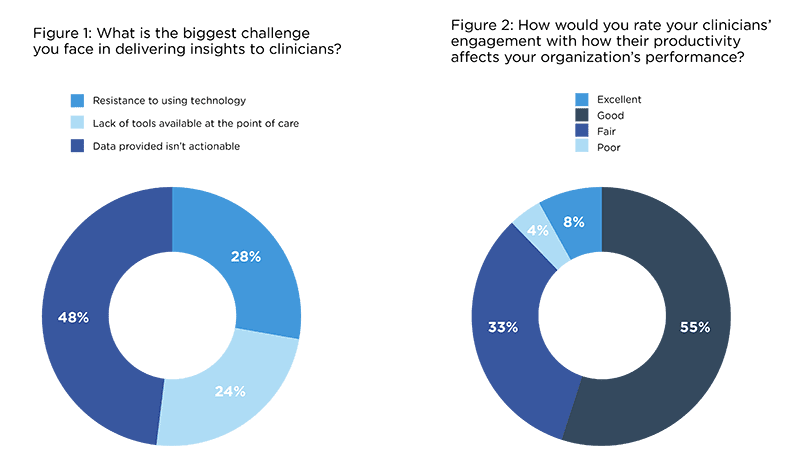In value-based care programs, flying blind is ill-advised. As more value-based care models incorporate two-sided risk, healthcare organizations have found that knowing how they are performing is vital to their financial health. But even today, many organizations struggle to close the gaps between their high-level value-based care strategies and on-the-ground insights that clinicians can use to enhance their performance and approach to care delivery.
What’s getting in the way?
That was the subject of a webinar we hosted on February 24th, 2020: how leading organizations are tackling the challenges of turning data into actionable insights that clinicians can use to evaluate performance. Our presenters were Stephanie Kovalick, chief strategy officer at Sage Growth Partners; Doug Mitchell, MD, CEO and co-founder of Adfinitas Health; and Chris Hegge, Director of product management at Ingenious Med.
 They noted that today, nearly every provider organization suffers from an enormous amount of unfiltered, non-normalized data sitting in data lakes rather than being shared with clinicians. Without access to this information, they are challenged to monitor, benchmark and enhance their performance. Compounding this problem is the difficulty of gathering performance data from beyond hospital walls.
They noted that today, nearly every provider organization suffers from an enormous amount of unfiltered, non-normalized data sitting in data lakes rather than being shared with clinicians. Without access to this information, they are challenged to monitor, benchmark and enhance their performance. Compounding this problem is the difficulty of gathering performance data from beyond hospital walls.
What healthcare stakeholders are saying
During the webinar, we polled participants to learn first-hand what they perceive as the greatest barrier to putting insights into clinicians’ hands. The top problem? Lack of actionable data. That was nearly twice as likely to be considered a challenge by the 76 participants who answered the question as ‘lack of tools at the point of care’ or ‘resistance to using technology’ (Figure 1).
 Specifically, when asked ‘What is the biggest challenge you face in delivering insights to clinicians?’ respondents said:
Specifically, when asked ‘What is the biggest challenge you face in delivering insights to clinicians?’ respondents said:
- 48% – Data isn’t actionable
- 28% – Resistance to using technology
- 24% – Lack of tools available at the point of care
We probed further to understand the extent of clinician engagement with using performance metrics (Figure 2). A total of 71 attendees responded with the following results:
- 8% – Excellent
- 55% – Good
- 33% – Fair
- 4% – Poor
Nearly two-thirds of respondents perceived their clinicians’ willingness to engage in performance metrics to be ‘good’ to ‘excellent;’ that’s consistent with what our customers tell us. It suggests that the key barrier to engaging clinicians in performance measurement is not their willingness – it’s their limited access to actionable data.
Breaking down the barriers
Adfinitas Health has been a leader in monitoring the productivity and performance of its clinicians and getting that data across the ‘last mile.’ It’s critical for them to prove value to hospital and post-acute partners as well as to insurers. Dr. Mitchell explained that Adfinitas pairs the charge capture data they get from Ingenious Med with other data from hospitals and HIEs to track provider-specific metrics such as 30-day readmission and complication rates.
 Recommendations for engaging clinicians in meaningful performance data without overburdening them include:
Recommendations for engaging clinicians in meaningful performance data without overburdening them include:
- Involve physicians early in the process
- Simplify data entry for clinicians using mobile charge capture tools at the point of care
- Frequently share trustworthy data with clinicians that makes it easy to compare their performance with peers at the same site and from site to site. Charge data is very effective because the physicians entered it themselves.
- Be transparent about the data and quickly address any issues that arise
- Standardize metrics so that all physicians and administrators are on the same page
- Ideally, present data using highly visual and interactive analytic dashboards that enable clinicians to quickly see where they rank highly or are outliers
- Dashboards should be role-based so they adapt to the different needs of providers and administrators
Equipping providers with datasets they trust and that enable them to easily benchmark their performance can go a long way to closing the insight gap. Clinicians need the right data paired with leadership that can point them in the right direction. Organizations can build that trust by making sure their analytics are founded on timely and reliable data.
Recognizing that closing the insight gap is critical, Ingenious Med has developed a new analytics suite: IM Analytics™. Using real-time data, it delivers data visualizations and insights where they matter most – the point of care. This provides clinicians and administrators with intuitive tools for evaluating and optimizing individual and group performance.
IM Analytics features intuitive, role-based dashboards that present physicians and administrators with the most pertinent information. They can examine data further with multiple preset reports covering critical metrics to quickly understand current trends based on real-time claims and EHR data. IM Analytics also provides business intelligence tools that examine data across more than 800 parameters, enabling users to customize reports and scorecards – even create personalized dashboards.
To learn more about IM Analytics, follow this link or contact us today.